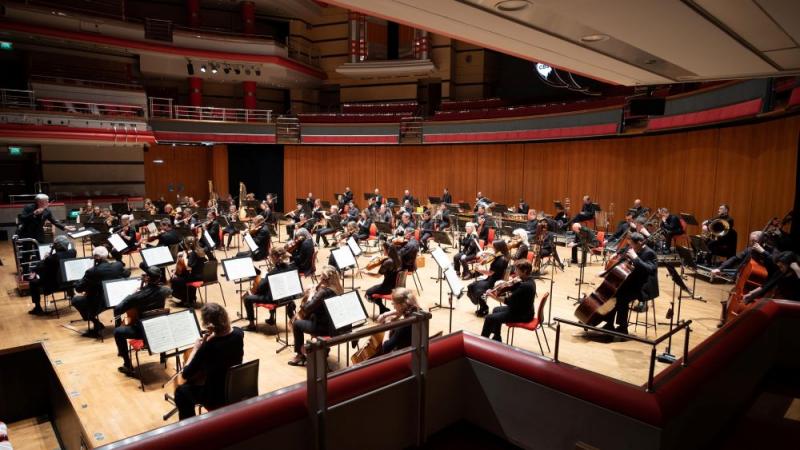Bostridge, CBSO, Seal, Symphony Hall Birmingham review - large and live | reviews, news & interviews
Bostridge, CBSO, Seal, Symphony Hall Birmingham review - large and live
Bostridge, CBSO, Seal, Symphony Hall Birmingham review - large and live
Malcolm Arnold's Fifth Symphony shoots for the stars in a programme of British rarities

The City of Birmingham Symphony Orchestra believes that its current post-lockdown summer series features the largest orchestra currently performing live in the UK. It’s not an easy claim to verify, and the full string section certainly wasn’t on stage for this matinee performance under the orchestra’s associate conductor Michael Seal.
So there was an almost physical depth and presence to the huge, translucent sheets of string tone that Seal deployed in Benjamin Britten’s Nocturne. This is the changeling half sister of Britten’s Serenade: a rich, strange garland of verses by poets ranging from Keats to Tennyson, all preoccupied with dream states and scored for a handful of obligato wind, brass and percussion instruments, plus strings. A chamber ensemble is implied, and I’ve never seen it done with more than a handful of players: certainly not with a string section (it looked like around 40 players) as large as this.
 It worked superbly, the added bulk of sound giving an eerie, overcast shimmer to Britten’s vast, becalmed vistas, and a satisfying bite to his sudden flashes of terror or wide-eyed joy. Up front, Ian Bostridge (pictured right) was the soloist, and Bostridge never does anything as straightforward as merely sing. He lost himself in the huge misty spaces between keening violins and velvet basses: flattening his tone into a sinister snarl, blanching it to a ghostly echo, or letting fly with brazen tenor fanfares in the sequence where Britten evokes Tennyson’s Kraken. That he could audibly tint and shape words almost by the syllable is testimony to Seal’s control over that big string section – a control which, paradoxically, allowed the other players to handle their musical illustrations and interjections with an improvisatory vividness: a glaucous, coiling bassoon; silvery thunder from the timpani, and harp flurries that sounded like spindrift in the moonlight.
It worked superbly, the added bulk of sound giving an eerie, overcast shimmer to Britten’s vast, becalmed vistas, and a satisfying bite to his sudden flashes of terror or wide-eyed joy. Up front, Ian Bostridge (pictured right) was the soloist, and Bostridge never does anything as straightforward as merely sing. He lost himself in the huge misty spaces between keening violins and velvet basses: flattening his tone into a sinister snarl, blanching it to a ghostly echo, or letting fly with brazen tenor fanfares in the sequence where Britten evokes Tennyson’s Kraken. That he could audibly tint and shape words almost by the syllable is testimony to Seal’s control over that big string section – a control which, paradoxically, allowed the other players to handle their musical illustrations and interjections with an improvisatory vividness: a glaucous, coiling bassoon; silvery thunder from the timpani, and harp flurries that sounded like spindrift in the moonlight.
The second part of this shortened concert (a planned opener of Bax’s Tintagel fell victim to Covid-era running times) comprised Malcolm Arnold’s Fifth Symphony: now 60 years old, as Seal reminded us in a brief spoken introduction (and it’s been the best part of half a century since the composer conducted the CBSO in a now-classic recording). Orchestration as brilliant as Arnold’s doesn’t need much help, but Seal – a former orchestral violinist – took nothing for granted in a performance that took this most compelling of modern British symphonies and made it gleam. The cataclysmic brass eruptions, the glistening harp and bell ostinati, and the cymbal topped sunbursts came through exactly as brilliantly as you’d hope. More surprising were the details revealed by Seal’s command of texture and balance: violin phrases arcing anxiously out of the tumult, or a celesta shimmering within a muffled string chord, like embers glimpsed through ashes.
Perhaps that makes it sound like a glorified concerto for orchestra. In fact, Seal made a powerful a case for this symphony, both as tautly-argued musical structure and compelling (and tragic) emotional narrative. The first movement was properly tempestuoso, and the great melody of the slow movement played out in an uneasy, fragile stillness which belied Arnold’s own self-mocking, defensive comment (he knew what to expect from the critics at that stage in the game) that ‘the composer is unable to distinguish between sentiment and sentimentality’. The final collapse, accordingly, carried its full emotional weight, and Seal brought the symphony to rest without point-making or exaggeration: the logical, and inevitable conclusion of a tragedy that had been prefigured from the opening bars. Sakari Oramo (another former orchestral violinist) gives Arnold’s Fifth its (belated) Proms premiere in August; meanwhile this was powerful and intelligent advocacy for a symphony whose time might finally have arrived.
rating
Share this article
Add comment
The future of Arts Journalism
You can stop theartsdesk.com closing!
We urgently need financing to survive. Our fundraising drive has thus far raised £49,000 but we need to reach £100,000 or we will be forced to close. Please contribute here: https://gofund.me/c3f6033d
And if you can forward this information to anyone who might assist, we’d be grateful.

Subscribe to theartsdesk.com
Thank you for continuing to read our work on theartsdesk.com. For unlimited access to every article in its entirety, including our archive of more than 15,000 pieces, we're asking for £5 per month or £40 per year. We feel it's a very good deal, and hope you do too.
To take a subscription now simply click here.
And if you're looking for that extra gift for a friend or family member, why not treat them to a theartsdesk.com gift subscription?
more Classical music
 Bizet in 150th anniversary year: rich and rare French offerings from Palazzetto Bru Zane
Specialists in French romantic music unveil a treasure trove both live and on disc
Bizet in 150th anniversary year: rich and rare French offerings from Palazzetto Bru Zane
Specialists in French romantic music unveil a treasure trove both live and on disc
 Scottish Chamber Orchestra, Ibragimova, Queen’s Hall, Edinburgh review - rarities, novelties and drumrolls
A pity the SCO didn't pick a better showcase for a shining guest artist
Scottish Chamber Orchestra, Ibragimova, Queen’s Hall, Edinburgh review - rarities, novelties and drumrolls
A pity the SCO didn't pick a better showcase for a shining guest artist
 Kilsby, Parkes, Sinfonia of London, Wilson, Barbican review - string things zing and sing in expert hands
British masterpieces for strings plus other-worldly tenor and horn - and a muscular rarity
Kilsby, Parkes, Sinfonia of London, Wilson, Barbican review - string things zing and sing in expert hands
British masterpieces for strings plus other-worldly tenor and horn - and a muscular rarity
 From Historical to Hip-Hop, Classically Black Music Festival, Kings Place review - a cluster of impressive stars for the future
From quasi-Mozartian elegance to the gritty humour of a kitchen inspection
From Historical to Hip-Hop, Classically Black Music Festival, Kings Place review - a cluster of impressive stars for the future
From quasi-Mozartian elegance to the gritty humour of a kitchen inspection
 Shibe, LSO, Adès, Barbican review - gaudy and glorious new music alongside serene Sibelius
Adès’s passion makes persuasive case for the music he loves, both new and old
Shibe, LSO, Adès, Barbican review - gaudy and glorious new music alongside serene Sibelius
Adès’s passion makes persuasive case for the music he loves, both new and old
 Anja Mittermüller, Richard Fu, Wigmore Hall review - a glorious hall debut
The Austrian mezzo shines - at the age of 22
Anja Mittermüller, Richard Fu, Wigmore Hall review - a glorious hall debut
The Austrian mezzo shines - at the age of 22
 First Person: clarinettist Oliver Pashley on the new horizons of The Hermes Experiment's latest album
Compositions by members of this unusual quartet feature for the first time
First Person: clarinettist Oliver Pashley on the new horizons of The Hermes Experiment's latest album
Compositions by members of this unusual quartet feature for the first time
 Gesualdo Passione, Les Arts Florissants, Amala Dior Company, Barbican review - inspired collaboration excavates the music's humanity
At times it was like watching an anarchic religious procession
Gesualdo Passione, Les Arts Florissants, Amala Dior Company, Barbican review - inspired collaboration excavates the music's humanity
At times it was like watching an anarchic religious procession
 Classical CDs: Camels, concrete and cabaret
An influential American composer's 90th birthday box, plus British piano concertos and a father-and-son duo
Classical CDs: Camels, concrete and cabaret
An influential American composer's 90th birthday box, plus British piano concertos and a father-and-son duo
 Cockerham, Manchester Camerata, Sheen, Martin Harris Centre, Manchester review - re-enacting the dawn of modernism
Two UK premieres added to three miniatures from a seminal event of January 1914
Cockerham, Manchester Camerata, Sheen, Martin Harris Centre, Manchester review - re-enacting the dawn of modernism
Two UK premieres added to three miniatures from a seminal event of January 1914
 Kempf, Brno Philharmonic, Davies, Bridgewater Hall, Manchester review - European tradition meets American jazz
Bouncing Czechs enjoy their Gershwin and Brubeck alongside Janáček and Dvořák
Kempf, Brno Philharmonic, Davies, Bridgewater Hall, Manchester review - European tradition meets American jazz
Bouncing Czechs enjoy their Gershwin and Brubeck alongside Janáček and Dvořák
 Solomon, OAE, Butt, QEH review - daft Biblical whitewashing with great choruses
Even a top soprano and mezzo can’t make this Handel paean wholly convincing
Solomon, OAE, Butt, QEH review - daft Biblical whitewashing with great choruses
Even a top soprano and mezzo can’t make this Handel paean wholly convincing

Comments
How does this work? This
Hello - thank you for your
What I feel Mr Bell needs to
What I feel Mr Bell needs to understand is that none of us in the classical music.opera line makes his or her living by criticism alone (nor is it desirable - you soon burn out if all you do is that). We have connections with orchestras and opera companies through programme notes; we meet and like artists we interview - or, in my present case, are indebted to their generosity in appearing in Zoom music appreciation classes/lectures. I have what I'd call professional friendships all stemming from initial admiration of the artists concerned. I'm not doind a friend a favour. I know that these performers will most likely never fall below a level of excellence, but at the same time no-one can interpret everything well, so if there's a disparity between what I expect to hear in a certain composer's work and the artist's view - or that of a director who doesn't seem to me to express the opera in question clearly, to tell the story - then I have written so, and always shall. If the artist has too fragile an ego to accept criticism from a well-wisher, then that's too bad.
There are several yarsticks here - Richard is one of our best writers, as Sebastian observes; this of all CBSO concerts might not have been covered at all otherwise, and everyone needs to know about Arnold's Fifth Symphony (as well as at least two others). So whatever you think, the gains outweigh any negatives. I always leave it up to writers, morevoer, to give a disclaimer if they wish, but it's up to them.
Oh Dear!! I cannot but feel
How does this work? Good
How does this work? Good question.
"Velvet basses". "A glaucous, coiling bassoon". Richard Bratby's crazily vivid writing is always a joy to read. That's how it works for me.